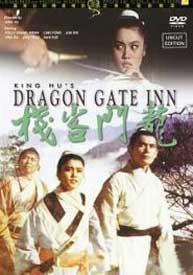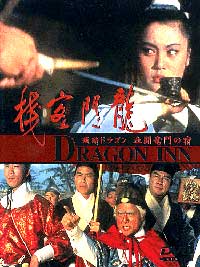 Right away the structure of Dragon Inn; aka, Dragon Gate Inn (Long men ke zhen, 1966) is distinct from most wuxia. It builds slowly for one thing, refusing to overlook mood & character to be action packed only. But when the action does begin, it is relentless to the close.
Right away the structure of Dragon Inn; aka, Dragon Gate Inn (Long men ke zhen, 1966) is distinct from most wuxia. It builds slowly for one thing, refusing to overlook mood & character to be action packed only. But when the action does begin, it is relentless to the close.
Beautifully scored with traditional instrumentation, Dragon Inn creates an audio & visual environment that envelops the viewer, brings us into a realm distant in time & place. A lot of time is spent at the front of the movie on the politics & this can be a little off-putting, especially as it's really a lot simpler than the history lesson would make it.
An innocent man, a general faithful to the emperor, has been framed & ultimately executed as a traitor, orchestrated by Tsao Shao Chin or Cao Shaoqin (Pai Ying), the chief eunuch of the Justice Ministry, who oversees the East Chamber Agency or dongchang of notoriously cruel police led by Shao Tung (Miu Tin).
The powerful eunuch's agenda does not always match up to that of the emperor, but he can't be touched. He sends East Chamber Agency thugs to track down & kill every living member of the beheaded general's family, which is the entire basis for the action that eventually erupts.
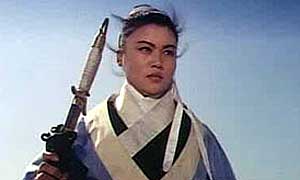 This cause for action is uninterupted by idle love story or subplot of twists & betrayals. Duplicity which makes so many period action films unnecessarily convluted is exchewed here. Everything is exactly as it seems & each side pursues the good vs evil path unwaveringly. This cause for action is uninterupted by idle love story or subplot of twists & betrayals. Duplicity which makes so many period action films unnecessarily convluted is exchewed here. Everything is exactly as it seems & each side pursues the good vs evil path unwaveringly.
Agency men have set up their headquarters at Dragon Gate Inn on a little-inhabited steppe, as there's nowhere else the targets of their malice can find shelter. It may be days or a week, but eventually the remnant of the Yu family will show up, & Agency men will be waiting.
By & large, for much of the film, the swordplay is kept somewhat realistic & down-to-earth, until near the end, when to raise the ante of violence there's some of the kitschy gravity-defying stuff happening.
In its day, the conventions of wuxia were not yet set in stone, & King Hu was being extremely innovative. Today some of it may look old-hat but only because King Hu was to be so heavily imitated, especially after the enormous box office success Dragon Inn had in just about every Asian & Southeast Asian country. But it'll a long search to find an imitation that is anywhere near as good as the original.
When Hu made Come Drink with Me (1966) the idea of all hell breaking out inside a traditional inn had not been done to death, & Hu had lit on something so effective that Dragon Inn followed up on the idea with a lot more action inside an inn. It is very nearly a one-set movie in taking the "fight at the inn" to extremes, & this saved on the budget besides being rather innovative for the time. Thirty years later we'll have seen so many fights in the inn that it's hard to realize how novel King Hu had been.
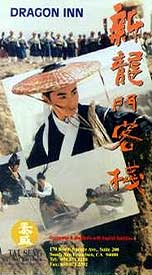 Even with the plethora of imitations that followed, King Hu's film is still one of the best wuxia ever made. It's nowhere near the equal of his way-out-in-front masterpiece A Touch of Zen (1971), regarded as the third in his "Inn Trilogy" that began with Come Drink with Me & Dragon Inn. Even with the plethora of imitations that followed, King Hu's film is still one of the best wuxia ever made. It's nowhere near the equal of his way-out-in-front masterpiece A Touch of Zen (1971), regarded as the third in his "Inn Trilogy" that began with Come Drink with Me & Dragon Inn.
But compared to other directors' work rather than to Hu's own absolute best, Dragon Inn is tops. Indeed, when "The 100 Greatest Chinese Films of the Twentieth Century" was compiled for Asia Weekly (Yazhou Zhoukan, 19 December 1999), only one director had two films in the top ten, & that was King Hu with Dragon Gate & Touch of Zen, though I must say I personally like Come Drink With Me a speck better than Dragon Gate because Drink stars my ultra-favorite Cheng Pei Pei.
King Hu had made Cheng Pei Pei a superstar swordplay heroine with Come Drink With Me but his desire for more control over his projects caused a falling out with Shaw Brothers, & he was not able to work with her again when he left the Shaws. He went from Hong Kong to Taiwan to make Dragon Inn at Union Film Company, & selected Polly Shang Kwan (aka, Shangguan Lingfeng) for the heroine role, catapulting her, at age seventeen, to superstardom as well.
The three best-loved swordswomen players of all time have remained King Hu's stars, Cheng Pei Pei from Come Drink with Me, Polly from Dragon Gate Inn, & Hsu Feng in A Touch of Zen.
Polly as young swordswoman Zhu Hui provides strongly appealing scenes as she insists on saving the Yu family. Polly is a bit stalker than most of the women who play such roles & this makes her look genuinely powerful. Her body language is androgynous, as she moves more like Lo Lieh than Shi Su.
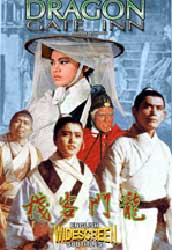 Xiao the Hero in White is played by Shih Jun, who was the non-martial scholar of A Touch of Zen. He stops in at Dragon Inn orders noodles & wine. There is much tension as we await King Hu's trademark battles amidst tables of an inn.
Xiao the Hero in White is played by Shih Jun, who was the non-martial scholar of A Touch of Zen. He stops in at Dragon Inn orders noodles & wine. There is much tension as we await King Hu's trademark battles amidst tables of an inn.
The East Agency thugs slip a drug into his wine, but he's not so easily fooled. A battle with these men erupts but they're helpless against the hero in white. He fights them off while still seated & eating noodles & drinking wine.
They come in greater numbers to bully him. Xiao catches one of their tossed knives in his chopstick. Commander Miu Tin in charge of these "justice" officials intercedes, behaving in a friendlier manner, chastising his men for overstepping. But of course Miu Tin is not to be trusted.
Xiao leaves the inn & sets out along the trail. He soon encountering Brother Wu Ning (Cho Kin) & immediately returns with him to the inn, which Wu Ning happens to own. By "brother" the story establishes a martial brotherhood link between these two, not family relationship. Wu Ning had formerly served the fallen hero General Yu, so is inescpably part of the rebel cause.
A brother & sister with strong martial skills arrive at the inn, refusing to be turned away. The daughter Yu Chien is played by Hsu Feng, who would dominate King Hu's next film, A Touch of Zen. As a matter of convention, young Miss Yu will fall for the Hero in White but really, such side-issues as love-interest will not much intrude on the story.
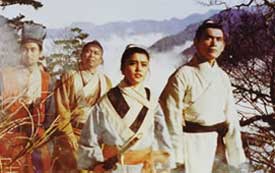 Miu Tin very soon figures out that among those who must be slain as either related to the Yu family, having helped the Yu family, or having knowledge that beheaded General Yu was framed, foremost must be counted the swordswoman Chu Hei, the brother & sister team, the hero in white, & the innkeeper & all the inn workers. Miu Tin very soon figures out that among those who must be slain as either related to the Yu family, having helped the Yu family, or having knowledge that beheaded General Yu was framed, foremost must be counted the swordswoman Chu Hei, the brother & sister team, the hero in white, & the innkeeper & all the inn workers.
The corrupt eunuch of the Justice Ministry arrives in person with additional forces to continue what has by now become nonstop action & perhaps just a little redundant. But King Hu also knows it's beginning to bog down under the weight of action & introduces a final mystery when Dragon Inn is unexpectedly abandoned by the survivors among the Yu faction, forstalling the final encounter with a good breather before taking it all up again.
It's also high time for a new setting. In the hills the chief eunich's duel with Xiao & the Yu family takes its toll on everyone. The battle goes on & on & on until even the most devout swordplay fan will be sated. And the idea recurring in wuxia, that eunuchs by right of their sexlessness have channeled greater martial energy into fighting power, finds its ultimate expression with Tsao Shao Chin.
Remade as a vehicle for Maggie Cheung, New Dragon Inn (Xin long men ke zhan, 1992) is inferior to the original, good though Maggie is. But a beautiful film made in homage to King Hu's Dragon Gate & to this classic period for wuxia is Goodbye Dragon Gate Inn (Bu san, 2003), well worth tracking down for any authentic film-fan.
Continue to next Cheng Pei Pei film:
Dragon Swamp 1967
copyright © by Paghat the Ratgirl
|
